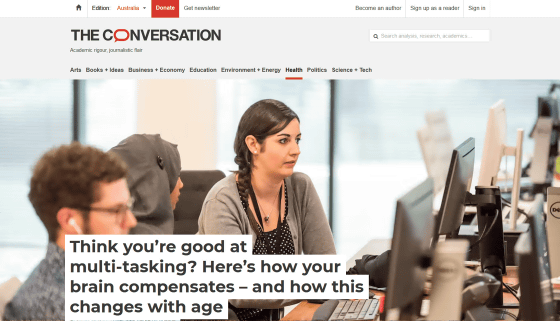Is multitasking really productive? Are there age-related differences in multitasking ability?

Modern people who are pressed for time every day tend to do multiple tasks at the same time, such as ``replying to work emails while watching TV,'' ``creating shopping notes while attending a meeting,'' and ``cooking while listening to a podcast.'' I save time by '
Think you're good at multi-tasking? Here's how your brain compensates – and how this changes with age
https://theconversation.com/think-youre-good-at-multi-tasking-heres-how-your-brain-compensates-and-how-this-changes-with-age-218343

Driven by the development of technology and improved work efficiency, modern people are required to ``complete a variety of tasks in a shorter amount of time,'' and they multitask many times during the day to complete multiple tasks. I'm dividing my attention between. However, Wilson points out that doing two things at the same time may be less productive and safe than concentrating on one thing.
The dilemma with multitasking is that when tasks become complex and energy-intensive, such as driving a car while talking on the phone, performance on one or both tasks decreases. The brain is divided into parts that play various roles, but when tasks that use the same part compete with each other, they interfere with each other, making it impossible to perform tasks successfully.
For example, the frontal lobe is responsible for both motor and cognitive tasks, but when the task of ``driving a car'' and ``talking on the phone'', which depend on the frontal lobe, are combined, it is difficult to suddenly slam on the brakes in the event of danger. This increases the risk of being late or missing signs or signals. Research has also shown that the more complex the content of a phone call, the greater the risk of an accident, even when making a hands-free call.

But that doesn't mean everyone can't multitask well. 'Generally speaking, the more skilled you are at a major motor task, the better your ability to perform other tasks at the same time,' says Wilson. 'Expert surgeons, for example, can multitask more efficiently than residents. 'Highly automated skills and efficient brain processes allow for greater flexibility when multitasking.'
Multitasking ability also improves with brain capacity and experience, so adults are better at multitasking than immature children. The multitasking ability of ``thinking about something while walking'' also develops during childhood and adolescence. When given a motor task such as holding a button, both walking speed and task execution speed decreased.
The maturation of the brain due to age is also related to multitasking ability, and as
Furthermore, Wilson points out that people with developmental coordination disorders that cause clumsiness in movement and movement are more likely to make mistakes when multitasking. Children with this disorder have difficulty performing cognitive tasks while walking, so it takes them longer to walk to school.

Older adults are also more prone to multitasking errors, and older adults walk much slower than younger adults when performing other tasks while walking. This becomes noticeable when you have to avoid obstacles, or when the road is winding or uneven.
As for the reason for this, Wilson said, ``Older people
However, older adults can improve their multitasking ability by performing cognitive tasks such as composing poems, making shopping lists, and playing word games while riding exercise bikes or walking on treadmills . It is said that it can be done.

'Remember that walking clears your mind and promotes creative thinking,' says Wilson. 'Several studies also show that walking helps you read and react to visual events in your environment.' 'We know that thinking while walking can have some benefits.'
Furthermore, he pointed out that multitasking has a large emotional and energetic cost, which can lead to a loss of leeway and increased stress, especially when you are pressed for time . If this condition continues, you will feel tired and empty.
Wilson says, ``Deep thinking requires energy, so be careful when crossing busy roads, descending steep stairs, or using power tools.'' Yes, you need to know when is the right time to ask someone a difficult question. It might not be when you're chopping vegetables with a sharp knife. Sometimes it's better to focus on one thing at a time. Sometimes,” he said.
Related Posts:
in Science, Posted by log1h_ik







